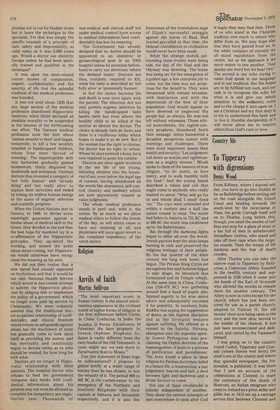Religion
Anvils of faith
Martin Sullivan
"The most important event in human history is the almost simultaneous appearance in the civilised world of higher forms of religion in the first millennium before Christ. In China: Confucius, In India: the Buddha. In Persia: Zarathustra. In Palestine: the later prophets. In Greece: Orphism. Prophetic Judaism is vastly different from the early books of the Old Testament. A cynic might say we owe more to Zarathustra than to Moses."
Can this statement of Dean Inge be substantiated? I propose to glance briefly at a wider range of history than he has chosen, to test the veracity of it. The period 900 to 800 BC is the curtain-raiser to the emergence of the Northern and Southern Kingdoms with their capitals at Samaria and Jerusalem respectively, and it is also the forerunner of the tremendous saga of Elijah's successful struggle against the forces of Baal. Had Jezebel prevailed at that time, the Hebraic contribution to civilisation would never have been made.
While the strange stories surrounding these events were being told, the day of the Iliad and the Odyssey was dawning. The scene Was being set for the emergence of a golden age, a few centuries yet to come, but the time was not propitious for the Israelit?.s. They were threatened with certain invasion, with destruction and with the deportation of the best of their population. God would appear to have deserted or neglected His people but, as always, He was not left without witnesses. Those ethical monotheists, the eighth-century prophets, thundered forth their message. Amos hammered a decadent prosperous nation with warnings and challenges. There were more important issues than wealth and security; "Let judgement roll down as waters and righteousness as a mighty stream." Micah spoke to them of the essence of true religion, "to do justly, to love mercy, and to walk humbly with thy God." And the young Isaiah described a vision and call that might come to anybody who really wanted to serve: "Who will go for us and whom shall I send? Send the." The cries were unheeded and within a century and a half the nation ceased to exist. The north had fallen to Assyria in 721 BC and in 586 BC the south was swallowed up by the Babylonians.
But through the darkness lights began to shine all over the world. Jewish patriots kept the altar lamps burning in exile and preserved the religious heritage of their people. By the last quarter of the sixth century the long trek home had begun. The Persian King Cyrus set his captives free and Judaism began to take shape, its literature was formulated and its Temple rebuilt. At the same time in China, Confucius (550-478 BC) was gathering around him a band of pupils who listened eagerly to his wise moral advice and subsequently recorded it for posterity. In northern India Buddha was urging the suppression of desire as the highest discipline and as the strongest weapon against suffering. He offered as a reward to the faithful, Nirvana, absorption into the supreme spirit. In Greece Pythagoras was proclaiming the Orphic doctrine of the transmigration of souls in a process of purification and punishment. The Jews found a place in their religion for Persian doctrines; belief in a future life, a resurrection, a last judgement, heaven and hell, a duel between light and darkness and a divine Saviour to come.
Not one of these revelations is entirely independent of another. They show the earnest attempts of men everywhere to seek after God if haply they may find Him. Those of us who stand in the Christian tradition owe much to others who differ from us. We may hope also that they have gained from us. In the white radiance of eternity we all stand equidistant from the centre, but as we approach it we move nearer to one another. "God speaks one word but we hear two." The second is our echo trying to make God speak in our language and in our tradition. But His hopes are to be fulfilled not ours, and our task is to recognise the echo for what it is and give our whole attention to the authentic voice and to the charge it lays upon us. I am a Christian and my first duty is to try to understand this faith and to live it. Humble discipleship of it will never allow roe to remove others from God's care or love.
































 Previous page
Previous page